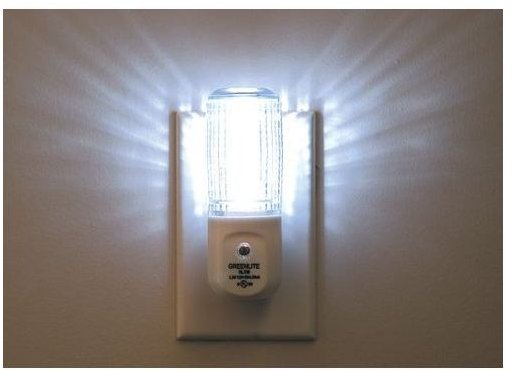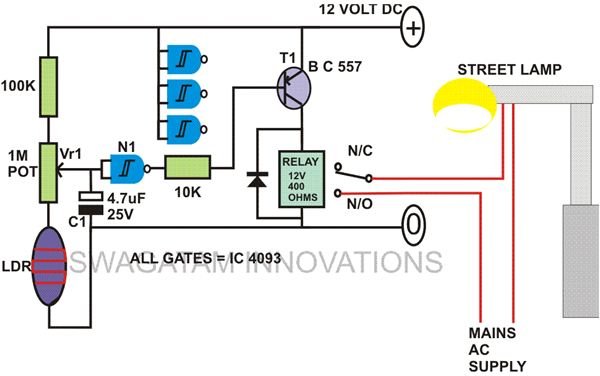How to Build Automatic Night Light Control or Switch
We all know how important it has become to save electricity in today’s circumstance where it is getting difficult to fulfill the power requirements for our cities. Today everybody along with the politicians and the official authorities are busy putting forth their own opinions regarding the issue. But ironically at times we find the street lights kept switched on even during broad daylight, and this clearly shows how irresponsible these men can be. So instead of depending on these officials, why not take some help from electronics and find a solution to get the work done automatically? A simple circuit of an automatic night light described in this article can very accurately switch ON a load (street lights for example) when darkness falls and switch it OFF when dawn breaks.
How the Circuit Functions
A single NAND gate, a PNP transistor and few other passive components are the only things needed to construct this useful gadget. The circuit description can be understood from the following explanation:
- As shown in the diagram a single NAND gate N1 from the IC 4093 is configured as an inverter and a voltage monitor.
- A reference voltage can be set at its input with the help of VR1. This adjustment will set the level of darkness at which the system will change state.
- An LDR (Light Dependent Resistor) which is also connected at the input of N1 is used to sense a difference in light levels. A LDR is in fact a resistor which changes its value with a change in the intensity of light falling on it.
- In the absence of light or when its dark, the LDR offers an infinite resistance and thus the input of N1 is kept at logic high due to the voltage received through VR1. This means that at this instant the output of N1 is logic low, the relay is activated through T1 and the lights (load) connected to the relay contacts are switched ON.
- With an increase in the ambient light the resistance of the LDR will gradually fall and after a certain level the input of N1 will become logic low. Immediately its output will go high switching OFF the transistor, the relay and the lights.
- Capacitor C1 has been kept to avoid the relay from chattering during twilight threshold levels.
How to Build and Install the Unit

The entire circuit of this 12 volt day night switch can be built over a small piece of general PCB and the whole assembly along with the transformer may be housed inside a good looking ABS plastic enclosure. Only the LDR has to be fixed over the box so that it can sense the ambient daylight.
Take due care to position the LDR in such way that no other stray light or the light which it’s controlling is able to be incident on it, or else it may produce false switching and may start oscillating. The best position would be to install the unit at a point much higher than the lights which are controlled by it.
This automatic night light system may also be appropriately used to control building porch lights, neon signs, large advertising displays, gallery lights and also as automatic house interior decorative lights. Thus this simple inexpensive circuit should not only be able to relieve you from the headache of timely switching the particular lights but also will result in quite an economical way of using them.
Automatic LED Day, Night Light Circuit Diagram
The above circuit was designed by me for Mr.Irfan after considering the following request made by him:
hello sir
i want a help from you…….
i have 100 LED BULBS (big ones,,larger than 5mm) i want to light them up by ac …..can i do this…please help me………
again , i want to know that can this led set can be connected to your day night switch and could it operate on ac????
i only want that when i plug it to ac socket,,the 100 big led light up with full brightness and turn on or off according to the day or night………………a battery can also be used instead making the circuit to run on ac,,if possible………….thank you……….pls help
